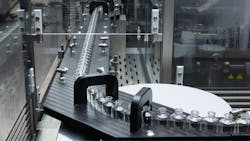PCI Pharma Services touts new sterile fill-finish capabilities in Bedford, New Hampshire
Large-scale GMP manufacturing activities for sterile fill-finish products are set to begin this summer at PCI Pharma Services’ new 50,000-square-foot facility at its Bedford, New Hampshire campus. The site is the third high-throughput, isolator-based commercial sterile fill-finish facility that the contract development and manufacturing organization has built in the last four years, according to the company.
PCI’s Bedford plant includes Annex 1-compliant sterile fill-finish manufacturing technologies, housing an aseptic vial fill-finish line within a fully isolated containment system equipped with twin 430-sq-ft lyophilizers — featuring automatic loading and unloading systems — and a high-speed integrated filler able to produce batches of up to 300,000 vials at speeds up to 400 per minute.
“That’s been under construction for the last three years or so,” said Jeff Clement, executive director of technical sales for PCI’s development and manufacturing group. “We’re right at the very edge of beginning GMP manufacturing. We’re wrapping up some final validations, and in a month or so we’re going to be doing the media fill qualifications.”
Clement told Pharma Manufacturing that PCI expects to run customer-specific engineering and GMP in the early fall 2025 timeframe. He contends that the new facility in Bedford will enhance PCI’s capacity and capabilities for the sterile fill-finish of late-phase clinical and large-scale commercial small molecule and biologic drugs, including monoclonal antibodies, fusion proteins, and peptides.
“This isn’t our first time at the rodeo, this is our third facility in the last four years” Clement said. “We’re continually looking at our capacities and capabilities and doing gap analyses. One of the things that we identified was large-scale, commercial manufacturing for liquids and vials.”
Among the equipment installed at the new Bedford facility are Smart Fill modules designed to maximize product usage and prevent underfills, SKANFOG decontamination technology, as well as quality control systems such as 100% weight checking and inline camera inspection.
At its Bedford campus, PCI also expanded its pharmaceutical development capabilities including repurposing an existing building into a dedicated Development Center of Excellence (CoE) providing formulation, analytical and process development, as well as stability testing.
The Development CoE, which is expected to be operational in early 2026, will handle both potent and non-potent active pharmaceutical ingredients (APIs), small molecules, proteolysis targeting chimeras (PROTACs), and a range of biologics including antibody-drug conjugates (ADCs).
“The investment into upgrading our upstream services is going to take us to the next level regarding formulation development,” according to Clement. “We’re going to be able to handle more potent compounds that we’ve not been able to do before.”
Last month, PCI completed its acquisition of Ajinomoto Althea, a U.S.-based sterile fill-finish CDMO previously owned by Japan’s Ajinomoto Co. The purchase, announced on April 24, is part of PCI’s broader $1 billion investment strategy aimed at expanding sterile manufacturing capabilities and advancing its drug-device combination product portfolio.
The Ajinomoto Althea site in San Diego will serve as a major hub for aseptic drug product manufacturing, adding capacity for high-potent vial filling with lyophilization and supporting production of complex formulations, including nanoparticles, mRNA, and ADCs. PCI contends that the expansion places it among the limited number of U.S. CDMOs equipped to handle high-potency ADCs.
“A big part of the Ajinomoto Althea acquisition was around getting into pre-filled syringes, and they also do have a high potent line,” Clement said. “We’re in the middle of a deep dive into an integration strategy. One of the key things that we want to get right is around the ADCs, because it’s been hot and we’re getting more and more customer inquiries.”
About the Author
Greg Slabodkin
Editor in Chief
As Editor in Chief, Greg oversees all aspects of planning, managing and producing the content for Pharma Manufacturing’s print magazines, website, digital products, and in-person events, as well as the daily operations of its editorial team.
For more than 20 years, Greg has covered the healthcare, life sciences, and medical device industries for several trade publications. He is the recipient of a Post-Newsweek Business Information Editorial Excellence Award for his news reporting and a Gold Award for Best Case Study from the American Society of Healthcare Publication Editors. In addition, Greg is a Healthcare Fellow from the Society for Advancing Business Editing and Writing.
When not covering the pharma manufacturing industry, he is an avid Buffalo Bills football fan, likes to kayak and plays guitar.
